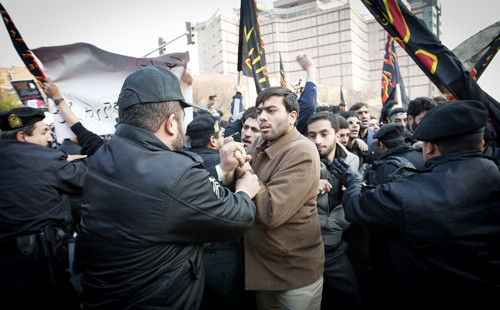|
 |
|
PUBLIC RAGE: Police try to prevent protesters from breaking into the British Embassy in Teheran on November 29. Thousands of Iranians demonstrated in front of the embassy after Britain announced new sanctions on Iran (XINHUA) |

Claims from Western countries that Iran would become a nuclear-armed state have been around since 2004. In the meantime, there have been constant predictions of a military strike by the United States and Israel on Iran. The recent release of an International Atomic Energy Agency (IAEA) report has fueled further speculation about possible military attacks.
On November 8, the IAEA released a new report on Iran's nuclear program. The report said credible evidence showed Iran has engaged in projects and experiments to develop nuclear weapons. "The information indicates that Iran has carried out activities relevant to the development of a nuclear explosive device," said IAEA Director General Yukiya Amano. Some of these activities are possibly still in progress, the report said.
In addition, Iran did not suspend its construction of an IR-40 heavy water reactor as required by the UN Security Council resolutions. Iran also failed to make a substantive response to the IAEA's requirement for further information about its nuclear program, the report said.
Iran dismissed the report immediately. The report contains nothing new and is merely a repetition of previous accusations against Iran, said Ali Asghar Soltanieh, Iran's Ambassador to the IAEA. It is "unbalanced, unprofessional and politically motivated," he said.
While reaffirming its responsibilities under the Nuclear Non-Proliferation Treaty, Iran said it will cooperate with the IAEA and put its nuclear activities under the supervision of the watchdog. At the same time, it declared that it will never give up its lawful right to conduct nuclear research.
Not surprisingly, the IAEA report has re-ignited the Iranian nuclear issue, which has lasted for almost 10 years. Western countries have imposed new sanctions on Iran. The United States announced sanctions on Iran's oil, petrochemical, banking and financial sectors. It warned that governments and financial institutions doing business with Iran would also be sanctioned. The U.S. Government has been trying to financially isolate Iran from the rest of the world.
The UK recently announced it will cut off financial connections with Iranian banks, including Iran's central bank. Canada will block "virtually all transactions" with Iran. France will ban oil imports from Iran. The EU will impose sanctions on another 200 Iranian firms and individuals. There have also been media reports saying a U.S.-backed Israeli military strike on Iran might be in the offing.
Russia, however, has insisted that the sanctions are not acceptable and are against international law. It has said the sanctions will complicate efforts to conduct constructive talks with Iran. In early September, Russia signed an agreement on nuclear cooperation with Iran. The two nations planned to seek more cooperation on Iran's Bushehr Nuclear Power Plant and other nuclear projects, said Russian Energy Minister Sergei Shmatko.
Iran's nuclear program started in the late 1950s during the rule of the former Shah, Mohammad Reza Pahlavi. At that time, Iran was an ally of the United States and was one of the pillars in Washington's "twin-pillar policy," which promoted Iran and Saudi Arabia as guardians of U.S. interests in the Middle East.
Therefore, the Iranian nuclear program gained technical support from the United States, Germany, France and Israel. Before the Islamic Revolution in 1979, the program had already taken shape. However, it was suspended due to the revolution. In the 1990s, Iran's nuclear activities were resumed with the help of Russia. In November 2003, the IAEA said after inspections that there was no evidence of Iran developing nuclear weapons.
Nevertheless, Western countries, which had been backers of Iran's nuclear program before the Islamic Revolution, insisted that Iran's nuclear activities are a grave threat to regional security and world peace. The logic underlying Western countries' shifting stance on the Iranian nuclear program is that their allies are allowed to pursue nuclear programs but their enemies are not.
| 